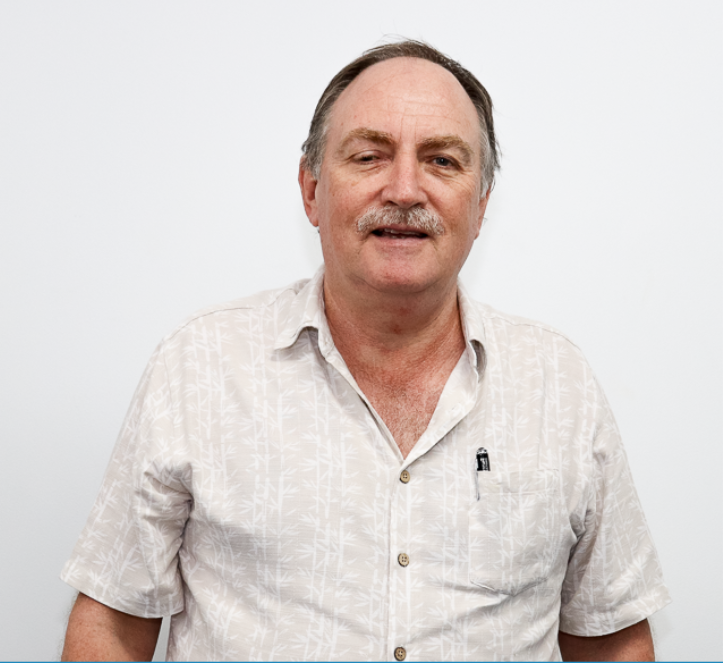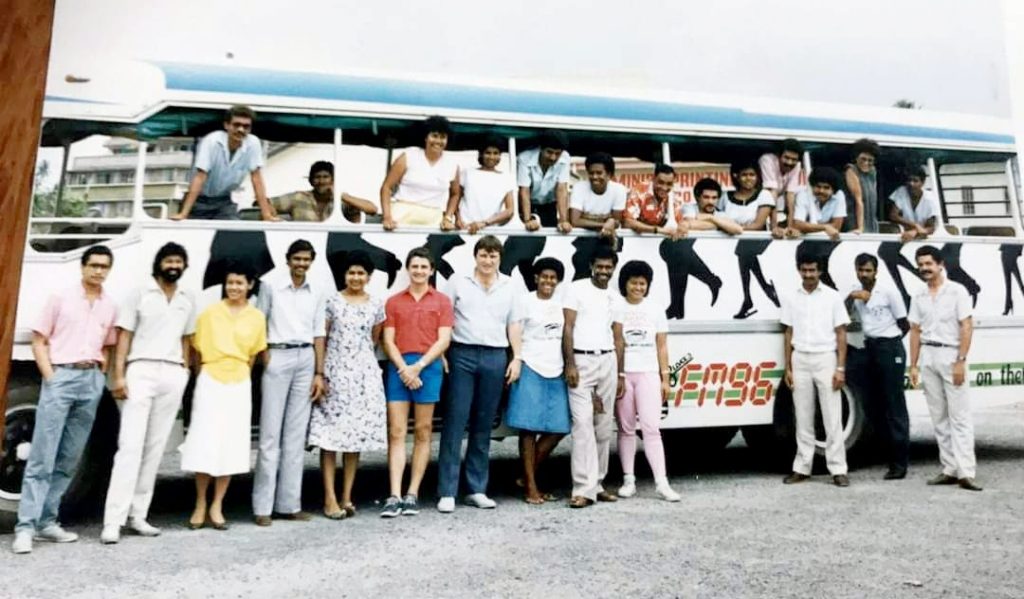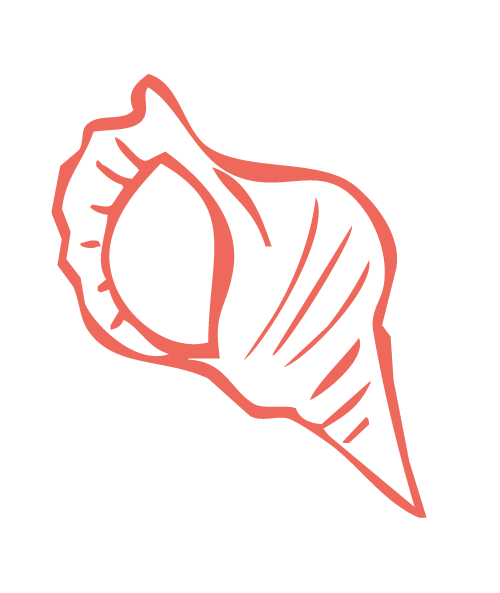William Parkinson: Pioneer

William Parkinson set up Fiji’s first commercial radio station when he was just 22.
With decades of entrepreneurial experience at the head of Communications Fiji Limited (CFL), Parkinson shares some of his lessons.
Be passionate about your business
“Ask yourself the question — Is this something that really keeps me awake at night?” Parkinson says. “I’ve got all these people around me who have come with me on this journey. I’ve got to pay them. I’ve got to keep the lights on. I’ve got to pay the bills. How the hell am I going to do it this way? And that is the moment when that passion kicks in, and that is what gets you through and what it takes to be an entrepreneur. And if you haven’t got that, then don’t start, just watch others or get in behind others in terms of setting up a business.”
Seek mentors
“I was very fortunate as a young entrepreneur to have some mentors along the way,” Parkinson says.
They included Harry Punja of Flour Mills of Fiji (FMF) fame (and many other businesses). Parkinson reflects that Punja is a “consummate entrepreneur, who’s constantly looking at new opportunities and new things to take on, and new challenges to tackle, things that he is passionate about.”
It was Harry Punja who shared with him the analogy of a blindfolded entrepreneur. “Some people tackle these entrepreneurial challenges and they bring lots of passionate energy, but they’re like a blindfolded man standing in the middle of a room. There’s one doorway, and yet they’ve got this blindfold on and to get through the doorway to achieve success, they spend all their energy just bouncing off the walls until they finally sort of stumbled through the doorway.
“A lot of early businesses are a bit like that. You haven’t stopped to have a think about it because you’re so excited about this new challenge that you’ve taken on
“The truly successful entrepreneurs are those who very quickly realise how to take the blindfold off and see where the doorway is. So how do you do that? You’ve got to step back and ask the tough questions.”
Parkinson says in Leadership Fiji, there’s a familiar story about stepping away from the drama of running the organisation. That is, “creating space for yourself even early on to say, you know what, I need time to think and reflect and ask myself some questions about what I’m doing and where we’re going. And that’s all about taking the blindfold off.”
So seek mentors around you in the early stages of your business venture, people who are going to support you in your process, but are also willing to challenge you. Maybe, in areas where you’re not particularly strong, he urges.
When encountering a mentor that seems “discouraging” and “generally negative”, you don’t need them in your life, he says. However, if it’s someone genuine, “it’s important to use those comments to challenge your worldview… don’t just take it at face value.”
Parkinson is also willing to reflect on where he has learnt through failure.
One of his “less successful entrepreneurial ventures” was setting up one of Fiji’s first Internet companies, Unwired, long before smartphones existed.
“Accessing the internet was a huge challenge for people in Fiji. And I thought, well, here’s this wireless internet that’s coming along. Maybe we, as an organisation, can go into this area and use our radio.
“I thought we had a competitive advantage in that regard to take a step into this whole area of the internet. But I didn’t realise, and I must admit, I was a bit blinded by how excited I was about the idea…[that] the people that were really going to dominate these areas were the mobile phone companies. And they were just waiting to stomp all over us. We just did not have the resources and the ability to compete.”
Communications Fiji Limited eventually got out of that business.
“So here’s an example of an idea which was cool, but couldn’t survive in that situation. But seeking out contrary voices around you, those mentors who are going to challenge you, and making sure that you learn to set your ego aside to listen to those contrary voices is really important. It’s always been my biggest challenge.”
Know your competitive advantage
Parkinson says one of the most important questions to ask yourself is a simple one. Why is someone going to buy your product or service?
Other important questions:
- Where will your followers/customers come from?
- Is there something unique about your product or service?
- What is your competitive advantage over everybody else in the market?
Around the same time that Parkinson was launching his first radio station, Mere Samisoni was setting up Hot Bread Kitchen (HBK). “Up to that point, we were all used to Chinese stores making bread but nothing on the scale of HBK, which was taken from a model she had borrowed from Australia. [It was ] a massive success but almost overnight then all these other copycat businesses were established… They [HBK] always understood their competitive advantage.
That prompts Parkinson to pose two more important questions:
- How easy is it to protect my competitive advantage?
- What are the barriers to preventing other people/entrepreneurs from just coming along to steal my great idea?
Evolve and adapt to the market
Parkinson says new entrepreneurs often fail to consider Fiji’s small domestic market size.
“We don’t realise that not only do we have a tiny market in global terms, but also it’s a very segmented market,” and says there is a thin layer of people with high net-worth, earning largely in Suva and in parts of the West, who can spend money on luxury items, entertainment, things that are outside of that sort of budget.
So you have to be careful in assessing a business, particularly to understand that the market breaks up, he said.
The basics
Ask yourself:
- How will I make a profit?
- What is my survival level?
“Find what it takes to get you to that point where you can pay the bills to survive as an organisation, and then start to look at ways in which you can expand,” Parkinson suggests.
Given Fiji’s small size, he says, “we always look sideways at what are some of the other fringe areas that I can add to continue the growth of the organisation.”
“Evolving and taking the time to evolve, rather than expecting this huge boom is something that we need to think about.”
Sometimes an idea requires time and patience. “We had a vision, we understood how important it was going to be and we continued to change and evolve and adjust over the periods of time,” he says of his own businesses.

Be disciplined in your planning
Entrepreneurs need to learn to be disciplined he believes; disciplined about spending money, disciplined about planning, and really thinking about the details of the business.
“The reality of the matter is that most entrepreneurs aren’t good [at discipline] and I include myself in there.
“Therefore, you need people around you to bring that discipline. I suspect for many of you, it will be an area of weakness… think about the areas of weakness, having that as part of that honest conversation with yourself.”
Relating a story from the early days of Communications Fiji, when the managing director has to step in to do a midnight on-air shift because the rostered announcer failed to show, he admitted that, “I needed to bring in people and give them the authority to step in, and have the responsibility of making sure that we stayed on while I focused on running the organisation.
“Every entrepreneur has that moment when you think I just physically can’t do everything. And so now I have to bring in others into the picture,” he said.
But he also warns, “Unless you take the time to induct them properly, to train them properly to bring in the systems and processes, which help them to understand how and why you run this organisation in the way you run it, it will be an absolute disaster. And this is a critical point where most small businesses fail as they have run out of energy.”
And finally
Parkinson likens entrepreneurship to digging a tunnel through a mountain. “One of the things that engineers will tell you, even the most experienced tunneling engineers, is that you are never really too sure what’s in the middle of that mountain. There will always be unexpected challenges along the way. As you’re digging your way through, you’ve got to be ready for changes in the rock fissures, all sorts of things can go wrong in that process, which is why when you read about tunneling or mining processes, almost inevitably, they will go over budget. And I like to think that entrepreneurship is a bit similar to that.”
To read
Reinventing the E-Myth. “It was one that changed my whole perspective. Sadly I read it 10 years too late. [It is] an essential book for all entrepreneurs because what the author gets out there is how important it is to create strategies when you’re setting up your business.”
https://fj.linkedin.com/in/william-parkinson-907a151a
Writer: Kite Pareti
.

